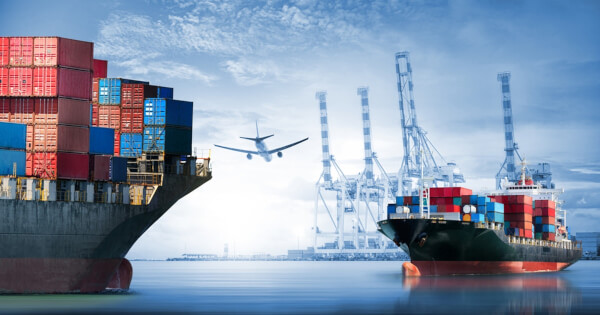Will Blockchain Make Shipping more Efficient in the Future?
Alo Kingsley Dec 07, 2019 00:00
Shipping in some cases is not restricted to the transportation of cargo by ships, but it refers to the transportation of items by mail of any means, the form of transportation could be air, road or train, but the most used form is transportation by sea.

Shipping in some cases is not restricted to the transportation of cargo by ships, but it refers to the transportation of items by mail of any means, the form of transportation could be air, road or train, but the most used form is transportation by sea.
According to the Ghana Shipping Guide, 90% of the trade in the world is dependent on the shipping industry; in other words, shipping is the lifeblood of the world’s economy. The shipping industry is one of the largest business industries ever and continues to expand, the international chamber of shipping (ICS) reports that there are over 50,000 ships at sea, that travel from nation to nation, carrying all types of cargo.
Although the shipping industry is continuously increasing in size and technological advancement, it is still plagued by its reliance on archaic systems and processes to conduct business, which in most cases is not sufficient to deal with the modern challenges facing shipping.
The Pros and Cons we See Today
The world’s largest shipping company, Maersk- in conjunction with IBM, launched in a blockchain venture, called TradeLens, aimed at transforming how trading activities are carried out. Blockchain has found itself in many industries all around the globe where it has either been used to solve problems or enhance performance and now we see it growing need in the shipping industry. But a significant issue of how exactly it can create an impact in this space still comes to mind. Here are some of the ways blockchain technology can make shipping more efficient:
1. Payment and dispute: According to Winnesota, it is estimated that about $140 billion is trapped in payment disputes that haven’t been settled, these losses recorded by business owners could inhibit the overall growth of this sector as it reduces the pace of advancement. For almost every invoice, the company it belongs to has to wait for up to 42 days before it can receive its payment. Such unnecessary delays will be eliminated or drastically reduced because blockchain technology will provide clarity with each financial payment, and also ensure money is delivered speedily to those who own it.
2. Cost of administration: Administration cost makes up to at least 20% of the shipping cost, which is mostly since most shipping companies rely on the use of paper to conduct their transactions. A shipment during its course of delivery could pass through the hands of 30 different organizations, which requires people at every station to monitor it and ensure delivery. With the use of blockchain technology, the system would be digitized thereby eliminating any need for traditional documentation, as every piece of information will be entered and stored on the blockchain ledger, it will also reduce the cost spent on paying employees, as the blockchain will be responsible for the security and monitoring of goods.
3. Efficiency in quality delivery: it is very common for cargo to get damaged or lost during shipment, when this happens it affects customer perception of the company’s service and lead may lead to instances where customers refuse to patronize them again. With the introduction of blockchain technology, customers can monitor the location of their products from the comfort of their homes, -this has already been implemented in some companies- in addition to this customers will also be able to verify the quality of their products, by accessing the certificate of origin from the manufacturer.
Challenges Faced
However disruptive and beneficial this technology might be to this sector there might be some drawbacks:
1. Issues of flexibility
In every transaction involving delivery, there would always be deliveries with unforeseen circumstances, which would be best addressed through a commercial appreciate this flexibility might be hindered.
2. Global adoption
One of the significant disadvantages faced by this technology in every aspect it can be implemented is in its adoption as many countries are yet to grasp the concept of what potential this technology holds, let alone implementing its usage. However, this might change in the coming years.
Image via Shutterstock

.jpg)